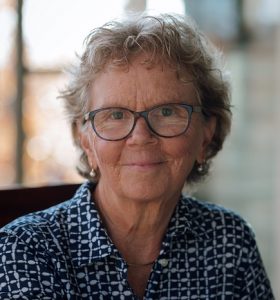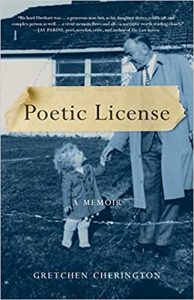Being Heard
Gretchen Cherington
 On August 5 my memoir, Poetic License, turns one year in the world. My publication date, last summer, is a day I’ll never forget. Flowers arrived from all over, including ones I’d sent myself; FedEx delivered a large print of the book’s cover framed under glass from a friend in New Mexico; hundreds of well-wishers clogged my inbox with emails, texts, Facebook posts, and iMessages; my six-sheet excel publicity schedule was filled. It was such a full day, with so much good news all at once; it was hard to take it all in.
On August 5 my memoir, Poetic License, turns one year in the world. My publication date, last summer, is a day I’ll never forget. Flowers arrived from all over, including ones I’d sent myself; FedEx delivered a large print of the book’s cover framed under glass from a friend in New Mexico; hundreds of well-wishers clogged my inbox with emails, texts, Facebook posts, and iMessages; my six-sheet excel publicity schedule was filled. It was such a full day, with so much good news all at once; it was hard to take it all in.
And a welcome break from the months-long anxiety I’d felt in the pit of my stomach about what might happen when I bore the truth about my father, a revered writer and friend to many, who had sexually molested me when I was seventeen. He was the “antagonist” in my book, the one I was trying to outgrow. My parents were deceased, and I’d prepared my children, brother, cousins, and ex-husband for the publication, but I didn’t know what might arise when the story went public.
Would Dartmouth College, where my father had taught for forty years, care? Would a woman I hadn’t known about with whom he’d had an affair rise from the embers of his long and successful literary career? These are normal concerns of memoirists airing family stories and some are shunned, disowned, or abandoned for doing so. My stomach had been a clenched fist for weeks.
Then, on Publication Day, something magical happened. By noon, my fist released. It felt a little like when your teenage kid drives themselves to college—you’ll miss her, worry about her, but you know you’ve done what you can; it’s her turn to fly in the world. The release of my book felt equally surreal and wildly freeing. I’d been revising and proofing for months, always believing I could write a better sentence, pick a better verb, until, one day, my savvy editor asked, “Do you want it perfect, or do you want it published?” A perfectly timed question to get me off the fence. I’d done all I could. It would fly on its own.
I count myself among the lucky memoirists who’ve had no familial fallout. I was delighted by the sheer numbers of people who read Poetic License, passed it along to friends, and reached out to me with their own stories of parental neglect, abuse, and worse. I read each message intently, both sickened by the club we find ourselves in, while elated that my personal and vulnerable story invoked meaning for so many, both men and women.
I started tracking the numbers of people propelled by my book to begin their own. So far, sixteen women have told me about what they’re working on and why Poetic License pushed them. Five are now seriously working with book coaches, editors, and beta readers. Four are already moving toward publishing contracts. Nearly a hundred personal, lengthy stories have been submitted to my website.
The phrase #nolongerwilling, for a phrase from my book has been attached to dozens of social media posts. One woman wrote about how, while visiting her hometown in a far-away state, she unexpectedly ran into her famous and flawed abuser from thirty years ago. On the spot, she chose to confront him, which offered her great relief because he acknowledged her truth.
Books change lives. Memoirs, especially, cut to the core of human experience in real time. Changed lives change others’ lives, fostering a better world. For all these tentacles of human connection, I am humbled and grateful. But getting a book out has also changed me. It’s allowed me a platform for issues I care deeply about.
It’s emboldened how I lead in my own community, whether in public meetings, social gatherings, or while serving on boards of directors. I’m no longer afraid of naming this part of me. My voice can speak for others who’ve yet to find theirs. I no longer conceal the many years of shame. The publicity required me to continue coming to terms with my father’s behavior, what it said about my family, and what it still says about our culture. Some days, I collapsed in exhaustion or escaped into the woods on my feet or my skis. I thought I’d plumbed every deep well to write the book, but deep wounds show up through time.
The immersion has made me ever more aware of little girls’ tendencies to idolize their fathers, deserved or not. Of our cultural idolization of heroes and stars. Great people, like the rest of us, have flaws. I now can read a poem by my father for its own sake. I can sit with pleasant memories, too, of summer cruises on Penobscot Bay—Dad at the helm, me with my dolls lined up against the portholes while I swayed to the rhythm of the waves below deck on my next canvas sling bunk, breathing in the pungent mix of bilge and engine oil.
Reliving my life through engagement with others on interviews, podcasts, at book clubs, or through reader messages, whether they came from Sydney or San Francisco, Frankfurt or Freeport, Tennessee or Topeka, has been like floating in a lake full of hard questions buoyed by full support, toes and face scanning the sky, ever more compassionate to myself and others than I was before.
Creating a better world takes guts. Listening takes guts. So too, the courage to be seen and heard. It takes too long, even if we try to bend ourselves toward justice. One year with Poetic License in the outer world has marked small, but real, steps forward in my inner world. I’m working on a second memoir now, due out next August, and I’m reminded of how important it is to claim our stories, to voice them out loud, so that our words can create a better world.
—
Gretchen Cherington is the author of the award winning memoir Poetic License. She grew up in a household populated by many of the most revered poets and writers of the twentieth century from Robert Frost to James Dickey. Her consulting career spanned thirty-five years advising top executives and their teams in changing their companies and themselves. As a leader she has served on boards twenty corporate and not-for-profit boards and is a frequent contributor to conversations on gender and power. Cherington received her BS and MBA degrees from the University of New Hampshire. Her essays have been published in numerous print and online journals. Her essay “Maine Roustabout” was nominated for a 2012 Pushcart Prize. Passionate about wild places, she’s traveled widely through the world, hiking, biking, skiing, and being in beautiful spaces with her family and close friends. She and her husband split their time between Portland, Maine and a saltwater cottage downeast. Her second memoir is due out from She Writes Press in August, 2022. Visit her at www.gretchencherington.com
POETIC LICENSE, A MEMOIR, Gretchen Cherrington
 At age forty, with two growing children and a new consulting company she’d recently founded, Gretchen Cherington, daughter of Pulitzer Prize–winning poet Richard Eberhart, faced a dilemma: Should she protect her parents’ well-crafted family myths while continuing to silence her own voice? Or was it time to challenge those myths and speak her truth―even the unbearable truth that her generous and kind father had sexually violated her?
At age forty, with two growing children and a new consulting company she’d recently founded, Gretchen Cherington, daughter of Pulitzer Prize–winning poet Richard Eberhart, faced a dilemma: Should she protect her parents’ well-crafted family myths while continuing to silence her own voice? Or was it time to challenge those myths and speak her truth―even the unbearable truth that her generous and kind father had sexually violated her?
In this powerful memoir, aided by her father’s extensive archives at Dartmouth College and interviews with some of her father’s best friends, Cherington candidly and courageously retraces her past to make sense of her father and herself. From the women’s movement of the ’60s and the back-to-the-land movement of the ’70s to Cherington’s consulting work through three decades with powerful executives to her eventual decision to speak publicly in the formative months of #MeToo, Poetic License is one woman’s story of speaking truth in a world where, too often, men still call the shots.
BUY HERE
Category: Contemporary Women Writers























